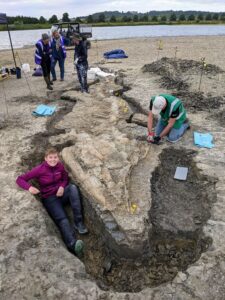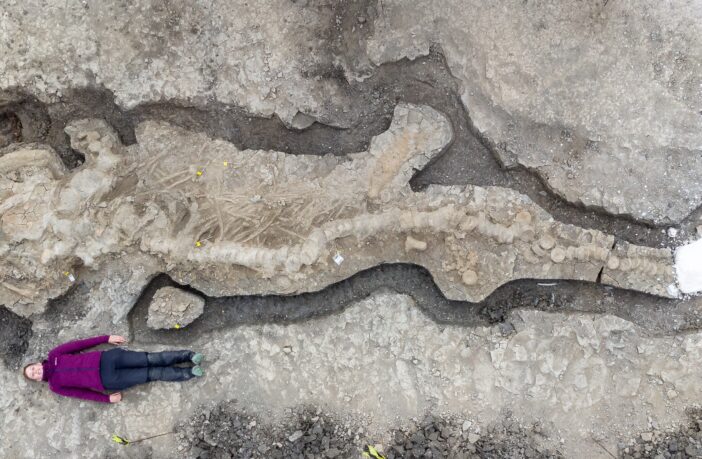Emily Swaby of the School of Environment, Earth and Ecosystem Sciences (EEES) at The Open University has been awarded the 2023 Wollaston Fund, presented by the Geological Society of London.
The Wollaston Fund award is named in honour of William Hyde Wollaston (1766-1828) and has been bestowed annually since 1831. It is awarded to an early career geoscientist who has made excellent contributions to geoscience research and its application, in the UK and internationally. Other recipients of the Wollaston Fund also include palaeontologists Gideon Mantell (1835) and Sir Richard Owen (1838), the latter of whom coined the term ‘dinosaur’.
Emily is currently a 3rd year PhD student and is funded by The Central England NERC Training Alliance (CENTA). Emily’s research is exploring the effects of the Toarcian (Early Jurassic, ~183 Ma) extreme environmental change on insects. The Toarcian Oceanic Anoxic Event (T-OAE) was a sudden and severe global event of extreme environmental change, associated with increased global palaeotemperatures, enhanced global chemical weathering rates, widespread marine anoxia, sea-level rise and increased atmospheric CO2 levels.
On land, global warming, wildfires and acid rain associated with the event resulted in a decrease in diversity and richness of land plants, which then had significant effects on the rest of the trophic web. Emily’s research is investigating what influence the T-OAE had on insects, in addition to the diversity and distribution of these organisms during this time.
Prior to her PhD studies, Emily graduated with a degree in Palaeontology from the University of Portsmouth in 2018, and then undertook a stand-alone one year Masters degree at the University of Manchester (2018 – 2020). Here, she received an MPhil in Palaeontology for a thesis that focused on a revision of the large ichthyosaur Temnodontosaurus crassimanus from the Lower Jurassic (Toarcian) of Whitby, Yorkshire, UK. This research formed the basis of her first lead-author scientific paper, published in the journal Historical Biology in 2020.

Emily next to the Rutland Sea Dragon
In August 2021, Emily was part of a small team which excavated the largest, most complete marine reptile skeleton ever unearthed in Britain, at the Rutland Water Nature Reserve. In July 2022, Emily was also part of an excavation team which unearthed a Jurassic marine ecosystem at a newly found site at Court Farm near Stroud, Gloucestershire.
The excavation, which was led by Sally and Neville Hollingworth, yielded fossil finds including exceptionally preserved fish, ichthyosaur bones, molluscs, coprolites, rare insects and more. In her spare time, Emily also writes popular palaeontology articles and blogs, undertakes a variety of public engagement, and has volunteered at various museums.
The award will be presented at the 2023 Awards Ceremony at Burlington House of the 14th June 2023.
On her win, Emily said:
“I’m both honoured and slightly taken aback to receive the Wollaston Fund! I’m incredibly grateful to the individual/s who nominated me for this award in the first place – I wouldn’t be where I am today without the help and support of those around me, including supervisors, colleagues, family and friends.



